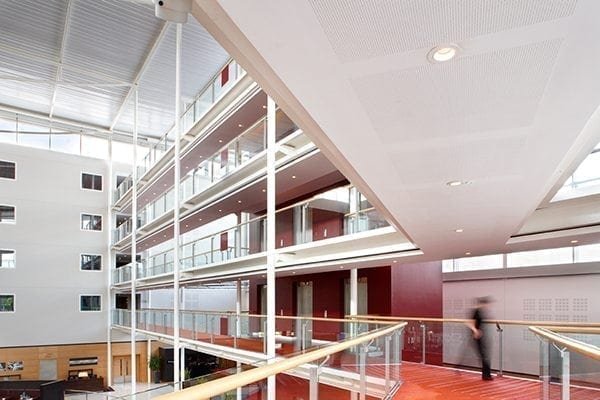How it works
Mark’s company helps its customers with everything from efficiency measurements to the supply and installation of water- and energy-saving products. ‘Ultimately for any of our customers, big or small, it’s about making sure they see a reduction in their bills equal to or greater than we calculated’, he says. ‘A savings calculator is linked to all the products on the savemoneycutcarbon.com website, and calculates potential savings immediately. For businesses and larger organisations, a full energy and water survey is recommended, conducted by our Field Services team.’
 The data collected by the team is plugged in to a financial modelling tool which flags where savings can be made and indicates return on investment. ‘This is then overlaid with other key details that have an impact on real savings and paybacks’, explains Mark, ‘such as usage assumptions and local utility prices together with reductions in maintenance costs. Post-installation smart monitoring provides ongoing proof points of savings, and helps to fine-tune the sustainability programmes.’
The data collected by the team is plugged in to a financial modelling tool which flags where savings can be made and indicates return on investment. ‘This is then overlaid with other key details that have an impact on real savings and paybacks’, explains Mark, ‘such as usage assumptions and local utility prices together with reductions in maintenance costs. Post-installation smart monitoring provides ongoing proof points of savings, and helps to fine-tune the sustainability programmes.’
The potential savings are huge. An LED lighting retrofit can generate energy savings of up to 85%, and offers a rapid return on investment with ongoing savings on energy and maintenance costs. One customer, Carlson Rezidor Hotel Group, saved over £250,000 in energy costs, as well as the associated reduction in carbon emissions, through a switch to LED installations. Intelligent controls for heating ventilation and air conditioning have reduced energy costs by up to 45% for another customer and one hotel group, The Hotel Collection, managed to save £100,000 inside eight months from a £65,000 investment in eco showers, eco taps and tap aerators. The additional benefits from reduced water heating bills, plus the associated reduction of the group’s carbon footprint, were a large added bonus.
Savings at home
As well as the eye-watering savings to be made through large-scale efficiency measures, energy-efficient installations can slash homeowners’ bills, too. According to Mark, switching traditional lighting for LED lamps could cut £650 off a typical three-bedroom home’s annual electricity bills, and reduce its carbon footprint by 50-70%. Eco showers, eco taps and tap aerators cut water consumption by over 50%, and every household — even those that aren’t on a water meter — would gain through reduced water heating and pumping costs. The planet would also benefit from the reduction in carbon emissions that would come as a result.
‘For consumers, the initial cost of LED lighting can cause hesitation’, explains Mark, ‘but when we explain that the LED lamps will usually pay for themselves within 18 months, then continue to deliver energy savings of up to 85% for a decade and more, the decision is made much more simple!’
For business, resistance to LED lighting can come from a bad experience of experimental installations of cheap, low-quality products. ‘Not every LED is the same and quality products will always outperform “cheap as chips” varieties’, says Mark. ‘We don’t go near the budget end, having seen the frankly awful light quality and average lifespan. One of our chosen partners is Soraa lighting; you get a beautiful natural light from the high-quality, cutting-edge products from this Nobel Prize-winning team. They’re cost-effective and extremely energy-efficient bulbs.’
A confusing environment
According to Mark, every business and organisation — across every sector — is growing more aware of the need to save energy and manage water consumption. ‘Historically, energy and water costs have been a very small portion of operating costs’, says Mark, ‘but this is changing rapidly as the cheap energy era comes to an end — a fact that the government’s been publicising over the past two to three years.’
But it’s also true that national energy efficiency policies have confused both businesses and consumers, leading to lower take-up of sustainability strategies. For Mark, the UK really needs a coherent, joined-up national energy efficiency plan that promotes — and financially supports — the whole range of energy- and water-saving solutions. ‘Everything from LED lighting to eco showers and taps, tap aerators, intelligent pumps and smart lighting and heating controls should be promoted, as well as effective insulation and efficient heating’, he says.
Mark acknowledges that ‘a great many consumers’ are already doing what they can within a confusing environment, but that we need crystal clear guidance and strong support from government to go further. ‘The Green Deal has been extremely disappointing’, he says. ‘It’s complex and very limited, with quite substantial investment and longer payback times. A new, comprehensive, more supportive deal is sorely needed right now.’
According to Mark, people need more than a ‘gentle nudge’ and a kind word of encouragement. ‘We’ve seen a massive education programme this year encouraging people to switch suppliers to get a better deal’, he says, ‘but little real progress on ensuring that people have detailed information about energy efficiency in the home. The little things make a big difference.’ Mark’s solution would be to put solar panels on every building and install products that reduce the water and energy we use: that, he says, would be ‘a true win-win’.
Consumer power
While the government could be doing more, Mark has confidence in the power of collective action. ‘I think we’re already seeing the “whip of the market” as consumers vote for sustainability with their purses and wallets’, he says. ‘This is concentrating the minds of many brands, and in the future I’d like to see a collaborative relationship developing between company and customer.’ With the rise of social media and other networks, the conditions for greater collaboration and communication between companies and their customers are already in place.
A recent five-continent report from Marketing to Mattering found that 72% of us believe business is failing to live up to our expectations. ‘Studies clearly indicate the issues facing chief executives around the globe’, says Mark. ‘Two-thirds of them admitted that their companies were not doing enough to address sustainability challenges. There’s an urgent need for business leaders to find better ways to develop sustainability strategies that reflect more accurately the hopes, expectations and needs of their customers.’
For more information on the products that could help cut your energy and water use — and give your bank balance a boost — visit savemoneycutcarbon.com. You’ll also be able to calculate the kinds of saving possible in your home.
 Play Video about This Rock Might Just Save The World
Play Video about This Rock Might Just Save The World Play Video about Play 2 hours of rock
Play Video about Play 2 hours of rock Play Video about Play 2 hours of brook
Play Video about Play 2 hours of brook Play Video about Play 2 hours of sheep
Play Video about Play 2 hours of sheep













































